Copyright Infringement Warning Letter
[Your Name]
[Your Address]
[City, State, Zip Code]
[Email Address]
[Phone Number]
[Date]
[Recipient's Name]
[Recipient's Address]
[City, State, Zip Code]
Subject: Copyright Infringement Warning
Dear [Recipient's Name],
I hope this letter finds you well. I am writing to bring to your attention a matter of serious concern regarding copyright infringement. It has come to my attention that certain materials protected by copyright, belonging to me or a party I represent, have been used without permission on your platform or website [URL or platform name].
The infringing content in question includes [describe the specific copyrighted works being infringed upon, such as images, text, videos, software, etc.]. These materials are protected under copyright laws, and their use without proper authorization is a violation of the exclusive rights granted to the copyright holder.
As the copyright owner, I have a legal responsibility to enforce my rights against copyright infringement. Unauthorized use of copyrighted materials can lead to severe consequences, including statutory damages, legal fees, and potential criminal penalties.
To resolve this matter amicably, I request the following actions:
1. Immediate removal of all infringing content from your platform or website.
2. Provide a written assurance that you will refrain from using any copyrighted materials without proper authorization in the future.
3. A response to this letter within [specify a reasonable timeframe, typically 10-14 days] to confirm that the infringing content has been removed and to address the steps you have taken to prevent similar instances in the future.
Please be aware that failure to comply with these requests may leave me with no choice but to take appropriate legal action to protect my rights. I sincerely hope it does not come to that, and we can resolve this matter without resorting to formal legal proceedings.
I strongly urge you to treat this matter with the utmost seriousness and take immediate action to rectify the copyright infringement on your platform. It is essential to respect the intellectual property rights of content creators and copyright owners.
If you have any questions or require any additional information regarding the copyrighted materials in question, please do not hesitate to contact me using the details provided above.
I look forward to your prompt attention to this matter and a positive resolution.
Sincerely,
[Your Name]
[Your Title or Copyright Holder if applicable]
[Your Signature if sending a physical letter]
Formal Cease and Desist Letter for Online Content Infringement
Subject: Cease and Desist - Copyright Infringement Notice
Dear [Recipient Name],
I am writing to inform you that content belonging to me has been used without authorization on your website/platform [Website URL]. Specifically, [describe the copyrighted work: article, image, video, etc.] originally published on [Your URL/Platform] on [Date] has been reproduced on your site without my permission.
As the copyright holder, I have exclusive rights to reproduce, distribute, and display this work. Your unauthorized use constitutes copyright infringement under the Digital Millennium Copyright Act (DMCA) and applicable copyright laws.
I demand that you immediately remove all infringing content from your website and cease any further use of my copyrighted materials. Please confirm removal within 10 business days of receiving this letter.
Failure to comply will leave me no choice but to pursue legal remedies, including potential damages and attorney fees.
I expect your prompt attention to this matter.
Sincerely,
[Your Name]
[Your Contact Information]
Professional Email for Social Media Copyright Violation
Subject: Copyright Infringement - Immediate Action Required
Hello [Username/Name],
I noticed that you've posted my copyrighted [photograph/artwork/video] on your [Instagram/Facebook/Twitter] account without permission. The original work can be found at [Your URL] and is protected under copyright law.
While I appreciate that you may enjoy my work, using it without authorization violates my rights as the creator. I kindly request that you remove the post within 48 hours.
If you'd like to use my work in the future, please reach out to discuss licensing options. I'm happy to work with people who respect intellectual property rights.
Thank you for your understanding and cooperation.
Best regards,
[Your Name]
[Contact Information]
Casual but Firm Message for Personal Blog Infringement
Subject: Hey, about that content on your blog...
Hi [Name],
I hope this message finds you well. I'm reaching out because I discovered that my article "[Article Title]" has been republished on your blog at [URL] without my permission.
I totally get that you might have found the content valuable and wanted to share it with your readers - I appreciate that! However, copying the entire article without asking isn't cool and actually violates copyright law.
Could you please either remove the article or replace it with a short excerpt (2-3 sentences max) and a link back to my original post? I'd be happy with either option, as long as we can resolve this within the next week or so.
Thanks for understanding, and I hope we can sort this out amicably!
Cheers,
[Your Name]
Formal Letter to Business/Company for Commercial Use
Subject: Notice of Copyright Infringement and Demand for Compensation
Dear [Company Name] Legal Department,
I am the copyright owner of [describe work], which I discovered is being used without authorization in your [marketing materials/website/product packaging/advertising campaign].
This constitutes willful copyright infringement, as your company is using my creative work for commercial gain without obtaining proper licensing or permission. The unauthorized use was first identified on [Date] at [Location/URL].
I demand immediate cessation of all use of my copyrighted material and compensation for the unauthorized commercial exploitation. Please provide within 14 days:
1. Written confirmation that all infringing materials have been removed from circulation
2. A detailed accounting of how my work was used and the duration of such use
3. A settlement proposal for damages
My work is registered with the U.S. Copyright Office under Registration Number [Number], establishing my legal standing. I am prepared to pursue statutory damages of up to $150,000 per willful infringement if this matter cannot be resolved promptly.
I expect immediate contact from your legal counsel.
Sincerely,
[Your Name]
[Address]
[Contact Information]
Preliminary Warning Email for First-Time Offender
Subject: Friendly Heads Up About Copyright
Hi there,
I wanted to reach out regarding some content on your [website/social media]. It looks like you've used my [photo/article/design] without permission, and I wanted to give you a friendly heads up before things get more formal.
I'm sure this wasn't intentional - copyright stuff can be confusing! But as the creator, I need to protect my work. Would you mind taking down the content? If you'd like to continue using it, we can definitely talk about permission or licensing.
Just let me know within the next few days how you'd like to proceed. I'm hoping we can resolve this easily!
Thanks,
[Your Name]
Serious Legal Notice for Repeat Infringer
Subject: Final Notice - Copyright Infringement Legal Action Pending
Dear [Recipient Name],
This is my [second/third] attempt to contact you regarding ongoing copyright infringement. Despite previous communications dated [Date] and [Date], you continue to use my copyrighted materials without authorization.
Your repeated infringement demonstrates willful disregard for intellectual property rights. This pattern of behavior significantly strengthens any legal claim for statutory damages and attorney fees.
You have 5 business days from receipt of this letter to:
- Remove ALL infringing content
- Provide written confirmation of removal
- Agree to cease any future unauthorized use
This is your final opportunity to resolve this matter without litigation. If I do not receive satisfactory response by [Specific Date], I will file a federal copyright infringement lawsuit without further notice.
Time is of the essence.
[Your Name]
[Attorney Name, if applicable]
Professional Email for E-commerce/Marketplace Seller
Subject: Copyright Infringement - Product Listing [Listing Number]
Dear Seller,
I am the copyright owner of [design/image/artwork] that is being used without authorization in your product listing on [Etsy/Amazon/eBay]. The listing in question is [URL/Listing ID].
Using my copyrighted work on products you're selling violates my exclusive rights and constitutes copyright infringement. I have not granted you a license or permission to reproduce my work.
I request immediate removal of the listing and all products featuring my copyrighted material. Additionally, I expect:
- Confirmation that inventory featuring my work has been destroyed or removed from sale
- Accounting of sales made using my copyrighted material
- Discussion of appropriate compensation
I am also filing a DMCA takedown notice with the platform. Please respond within 7 days to avoid further action.
Regards,
[Your Name]
[Contact Information]
DMCA Takedown Notice to Website Host/Platform
Subject: DMCA Takedown Notice - Copyright Infringement
To Whom It May Concern,
I am submitting this notice under the Digital Millennium Copyright Act (DMCA) to report copyright infringement on your platform.
Copyright Owner Information:
Name: [Your Full Name]
Address: [Your Address]
Email: [Your Email]
Phone: [Your Phone]
Copyrighted Work: [Description of your original work]
Original Location: [URL where your original work appears]
Infringing Material:
URL(s): [List all URLs where infringement occurs]
I have a good faith belief that the use of the material described above is not authorized by the copyright owner, its agent, or the law.
I swear, under penalty of perjury, that the information in this notification is accurate and that I am the copyright owner or authorized to act on behalf of the owner.
Signature: [Your Signature]
Date: [Date]
Please remove or disable access to the infringing material expeditiously.
Sincerely,
[Your Name]
What is a Copyright Infringement Warning Letter and Why Send One
A copyright infringement warning letter is a formal communication sent to an individual or entity that has used your copyrighted material without permission. The primary purposes include:
- Establishing a legal record of your attempt to resolve the matter before litigation
- Educating the infringer about their violation and your rights
- Demanding cessation of unauthorized use
- Requesting compensation for damages when applicable
- Protecting your intellectual property from further exploitation
- Demonstrating due diligence in enforcing your copyrights
- Opening negotiation channels for licensing or settlement
- Avoiding costly litigation by resolving matters early
When Should You Send a Copyright Infringement Warning Letter
Send this letter when you encounter:
- Discovery of unauthorized reproduction of your text, images, videos, or other creative works
- Commercial exploitation of your work without licensing
- Social media posts using your content without credit or permission
- Website content theft including blog articles or photographs
- Product designs or packaging copying your original work
- Repeated violations after informal requests to stop
- Revenue loss due to someone else profiting from your work
- Brand confusion caused by unauthorized use of your materials
- Before filing a lawsuit as a required good-faith effort
- When informal communication fails to achieve resolution
- Discovery of your work on e-commerce platforms without authorization
- Plagiarism situations where attribution and removal are needed
Who Should Send Copyright Infringement Warning Letters
The letter should come from:
- The copyright owner (creator of the original work)
- Registered copyright holders with formal registration documentation
- Authorized agents acting on behalf of the copyright owner
- Business entities that own copyrights through employee work-for-hire agreements
- Intellectual property attorneys representing copyright holders
- Estate executors managing deceased creators' copyrights
- Exclusive licensees with enforcement rights granted in licensing agreements
- Content management agencies authorized to enforce rights
- Publishers or production companies that acquired copyrights through contracts
To Whom Should Copyright Infringement Letters Be Addressed
Direct your letter to:
- The individual infringer using identifiable contact information
- Website owners whose sites display infringing content
- Business legal departments for corporate infringers
- Platform administrators (YouTube, Instagram, Facebook) via DMCA processes
- Web hosting providers when direct contact with infringer fails
- Marketplace operators (Amazon, Etsy, eBay) for seller violations
- Domain registrars in severe cases
- ISP providers as intermediaries
- Registered agents for DMCA compliance (found in website terms)
- Company directors or officers when business entities are involved
- Multiple parties simultaneously if several entities are responsible for the infringement
Requirements and Prerequisites Before Sending the Letter
Before sending your warning letter, ensure you have:
- Proof of copyright ownership (registration certificate, creation dates, original files)
- Evidence of infringement (screenshots, URLs, archived pages, purchase receipts)
- Timestamps documenting when your work was created and when infringement occurred
- Original creation files with metadata showing you as the creator
- Documentation of previous communications if any informal requests were made
- Accurate contact information for the infringer
- Copyright registration (strengthens legal position, though not required for protection)
- Understanding of fair use to ensure your claim is valid
- Consultation with an attorney for significant commercial infringements
- Calculation of damages if seeking monetary compensation
- Clear identification of which specific content is being infringed
- Verification that you own the rights (not just licensed to use it yourself)
How to Write and Send a Copyright Infringement Warning Letter
Follow this process:
- Document everything first before writing the letter
- Choose appropriate tone based on severity and infringer's apparent intent
- Clearly identify yourself and establish your ownership
- Specifically describe the copyrighted work with details
- Pinpoint the infringement with exact URLs, dates, and locations
- State your legal rights and cite relevant laws (DMCA, Copyright Act)
- Make clear demands (removal, compensation, cease future use)
- Set a reasonable deadline (typically 5-14 business days)
- Mention consequences of non-compliance without making empty threats
- Provide contact information for response
- Keep language professional even when frustrated
- Send via methods with proof (certified mail, email with read receipts)
- Keep copies of everything you send
- Follow platform-specific procedures for DMCA takedowns when applicable
Formatting Guidelines for Copyright Infringement Letters
Structure your letter properly:
- Length: 1-2 pages for standard cases; longer for complex commercial infringement
- Tone: Professional and firm; escalate severity based on situation
- Format: Business letter format for formal letters; professional email format for digital communication
- Subject line: Clear and direct ("Copyright Infringement Notice" or "DMCA Takedown Request")
- Opening: Identify yourself and state the purpose immediately
- Body structure: Facts first, then demands, then consequences
- Evidence: Include or reference specific proof without overwhelming detail
- Legal citations: Reference relevant laws appropriately without excessive legalese
- Closing: Professional signature with full contact information
- Attachments: Include proof of ownership and infringement when sending via mail
- Delivery method: Certified mail for serious matters; email for speed and platform requirements
- Professional appearance: Use letterhead if available; avoid casual formatting
Elements and Structure Your Letter Must Include
Every copyright infringement letter should contain:
- Your identification: Full name, address, contact information
- Copyright claim: Clear statement that you own the copyrighted material
- Work description: Specific details about your original creation
- Proof of ownership: Registration numbers, creation dates, publication information
- Infringement details: Exact description of what was copied and where
- Location of infringement: URLs, physical locations, platform names
- Date of discovery: When you found the infringement
- Legal basis: Reference to copyright law and your exclusive rights
- Demands: Specific actions required (remove content, cease use, pay damages)
- Deadline: Reasonable timeframe for compliance
- Consequences: Statement of next steps if demands aren't met
- Good faith statement: For DMCA notices, statement that use is unauthorized
- Contact information: Multiple ways to reach you for response
- Signature: Physical or digital signature with date
- Attachments: Supporting evidence, screenshots, proof of copyright
After Sending: Follow-Up Actions and Next Steps
Once you've sent the letter:
- Track delivery using certified mail receipts or email read confirmations
- Wait for the deadline you specified before escalating
- Monitor the infringing location to verify whether content was removed
- Document compliance or non-compliance with dated screenshots
- Respond promptly to any counter-notices or communications
- Preserve all correspondence for potential legal proceedings
- Send reminder notices if deadline passes without response
- File DMCA takedowns with platforms if direct approach fails
- Escalate to attorney if infringer ignores multiple notices
- Consider settlement discussions if infringer responds cooperatively
- Prepare for litigation if necessary, gathering all documentation
- Update your records regarding which entities have been notified
- Thank cooperative infringers who comply quickly to maintain goodwill
Pros and Cons of Sending Copyright Infringement Warning Letters
Advantages:
- Creates legal record of enforcement efforts
- Often resolves issues without litigation costs
- Educates infringers who may not realize their violation
- Demonstrates seriousness about protecting your work
- Required step before pursuing statutory damages in many cases
- Can lead to licensing negotiations and revenue
- Relatively inexpensive compared to lawsuits
- Empowers creators to defend their rights
Disadvantages:
- May not be effective against determined infringers
- Can escalate situations unnecessarily in minor cases
- Risks public relations backlash if perceived as aggressive
- Time-consuming to document and send properly
- May reveal information about your copyright you'd prefer to keep private
- Could trigger counter-claims or disputes
- Ineffective against international or anonymous infringers
- Creates ongoing obligation to monitor compliance
Common Mistakes to Avoid When Sending Copyright Warnings
Don't make these errors:
- Sending without sufficient evidence of ownership or infringement
- Using threatening language that could be considered harassment
- Making false claims about copyright status or damages
- Setting unrealistic deadlines that are too short
- Being vague about what content is infringed or what you're demanding
- Ignoring fair use considerations that may protect the use
- Sending to wrong parties without researching proper recipient
- Forgetting to keep copies of all communications
- Acting on emotion rather than facts and law
- Demanding excessive compensation without legal basis
- Using templates without customization to your specific situation
- Neglecting to include proper contact information
- Sending prematurely before gathering complete evidence
- Failing to follow DMCA requirements for platform takedowns
- Making empty threats you're not prepared to follow through on
Compare and Contrast: Copyright Letters vs. Other Enforcement Options
Copyright Warning Letter vs. DMCA Takedown:
- Letters go directly to infringer; DMCA goes to platforms hosting content
- Letters allow negotiation; DMCA is more rigid and formal
- DMCA requires specific format and good faith statements
- DMCA can result in quick removal; letters may take longer
Copyright Letter vs. Cease and Desist:
- Copyright letters focus specifically on infringement; cease and desist covers broader violations
- Both serve similar functions but copyright letters cite specific copyright law
- Cease and desist may include trademark or other intellectual property issues
Warning Letter vs. Immediate Lawsuit:
- Letters are far less expensive and faster
- Letters provide opportunity for settlement
- Lawsuits may be necessary for willful, commercial infringement
- Many jurisdictions require good faith effort (letter) before litigation
Formal vs. Informal Approach:
- Informal messages preserve relationships but carry less legal weight
- Formal letters create stronger legal records
- Choose based on relationship with infringer and severity of violation
Tips and Best Practices for Effective Copyright Enforcement
Smart strategies include:
- Start with friendliest approach appropriate to the situation
- Document infringement thoroughly before making contact
- Research the infringer to understand if violation was likely intentional
- Use DMCA procedures for platform-hosted content simultaneously
- Set deadlines that are firm but reasonable (7-14 days typically)
- Be specific about every demand rather than using general language
- Consider offering licensing options rather than only demanding removal
- Escalate tone and formality with each subsequent letter if needed
- Consult an attorney before sending letters for high-value commercial cases
- Use tracking methods that provide proof of delivery and receipt
- Keep detailed records of all enforcement actions for future reference
- Monitor for compliance after sending rather than assuming it will happen
- Be prepared to follow through on stated consequences
- Join with other creators when facing serial infringers
- Consider the cost-benefit ratio of enforcement versus ignoring minor violations
Frequently Asked Questions About Copyright Infringement Letters
How long should I wait for a response? Typically give 7-14 business days; adjust based on complexity and severity.
What if I don't know who the infringer is? Use WHOIS lookups for websites, contact platforms directly, or consult an attorney for discovery options.
Can I demand money in my letter? Yes, but ensure your damage calculations are reasonable and based on actual harm or standard licensing fees.
What if the infringer claims fair use? Evaluate their claim seriously; fair use is a complex legal defense that may be valid.
Do I need a lawyer to send this letter? Not required, but recommended for valuable works or commercial infringement cases.
What if they ignore my letter? Send follow-up notices, file DMCA takedowns, and consider legal action if the matter is significant enough.
Can this letter make things worse? Rarely, but poorly written threats or false claims can trigger counter-suits or public backlash.
Should I register my copyright first? Highly recommended; registration enables statutory damages and attorney fee recovery in lawsuits.
How much does it cost to send these letters? DIY costs are minimal (postage/email); attorney-drafted letters range from $200-$1000+.

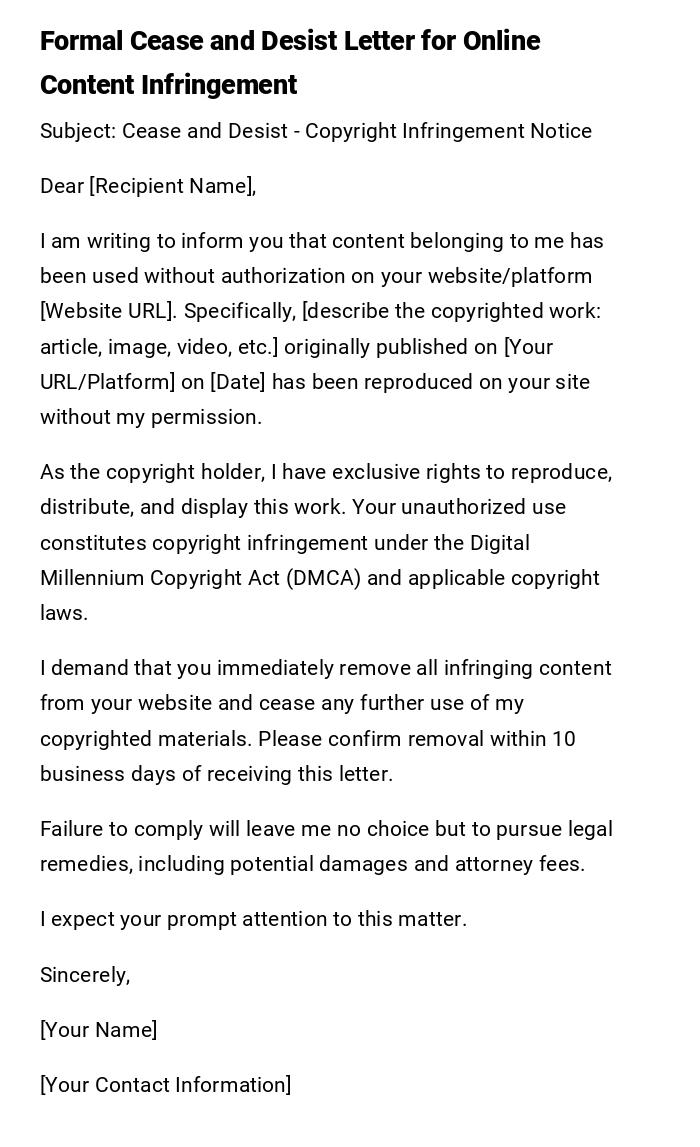
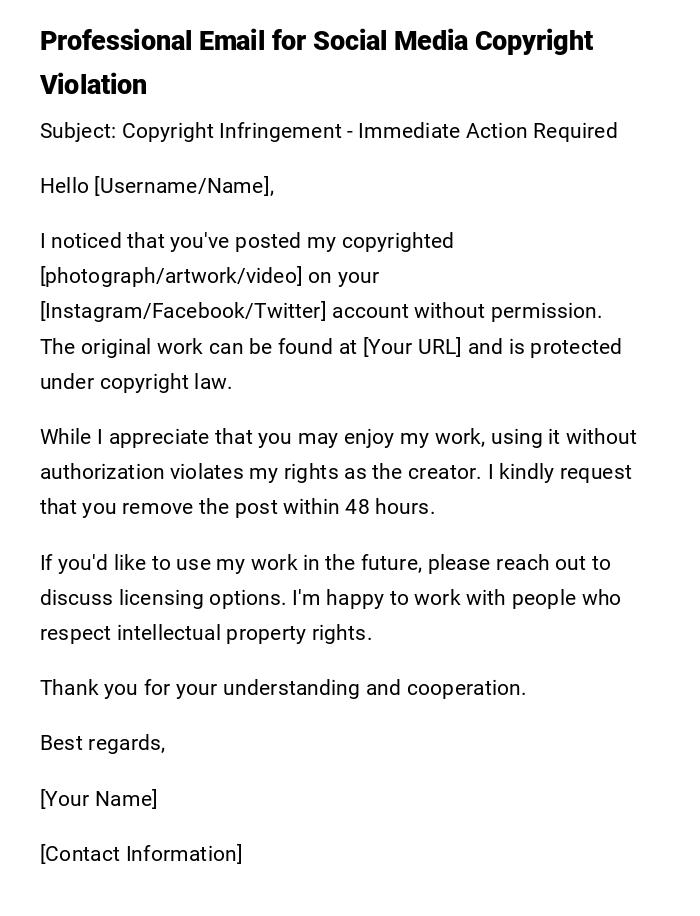
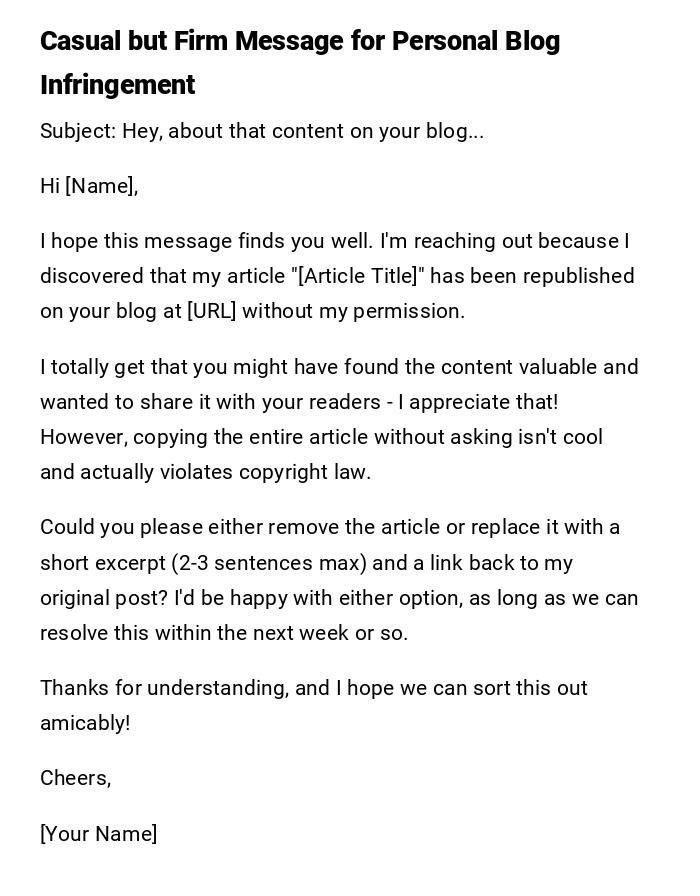
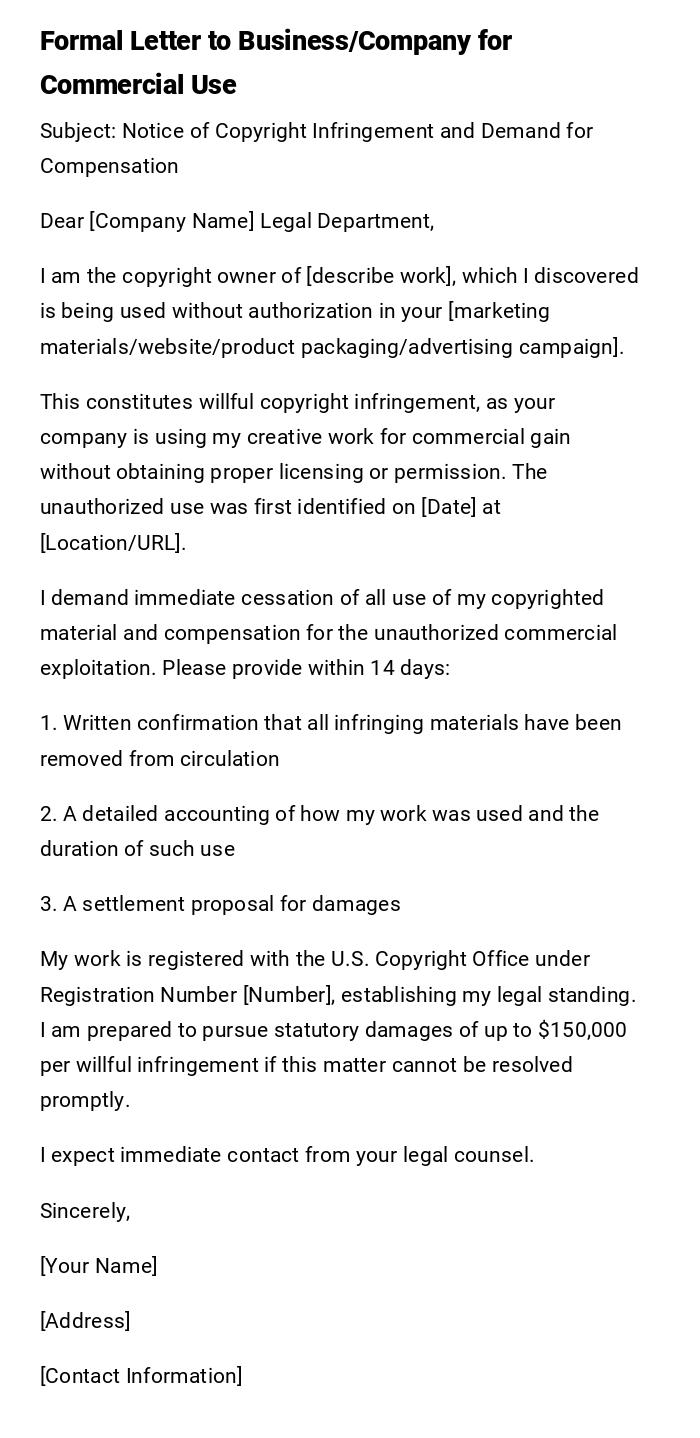
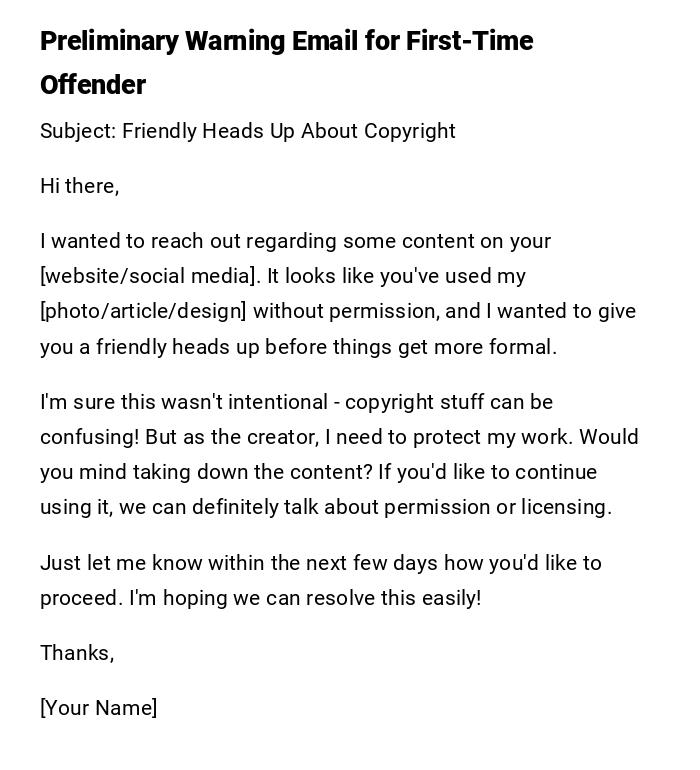
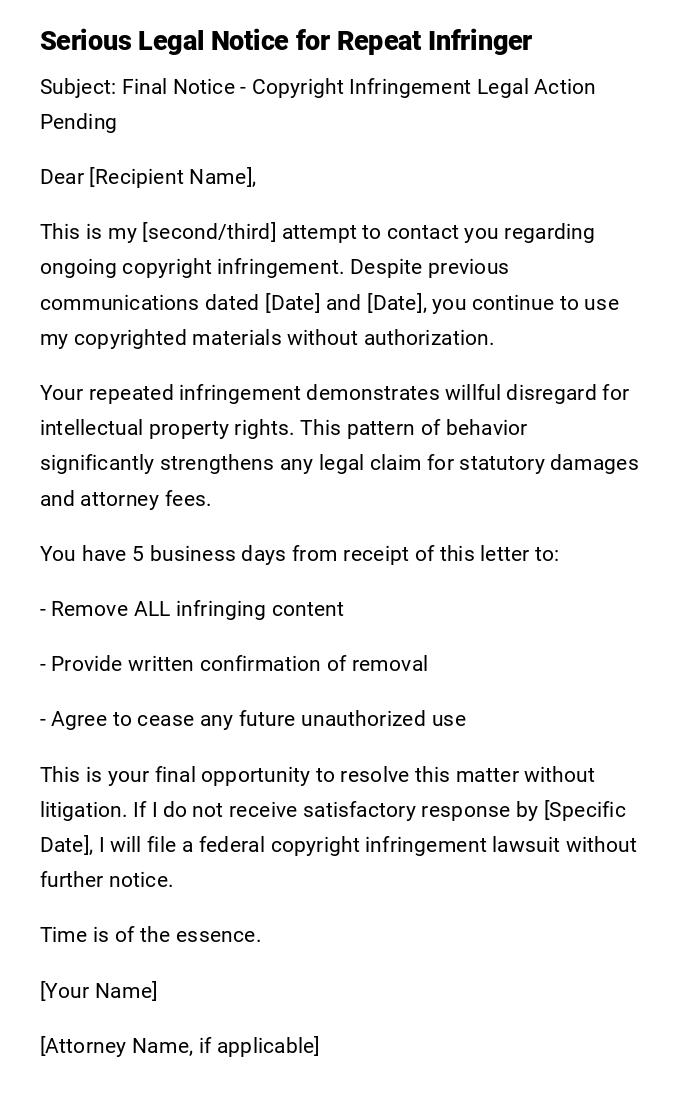
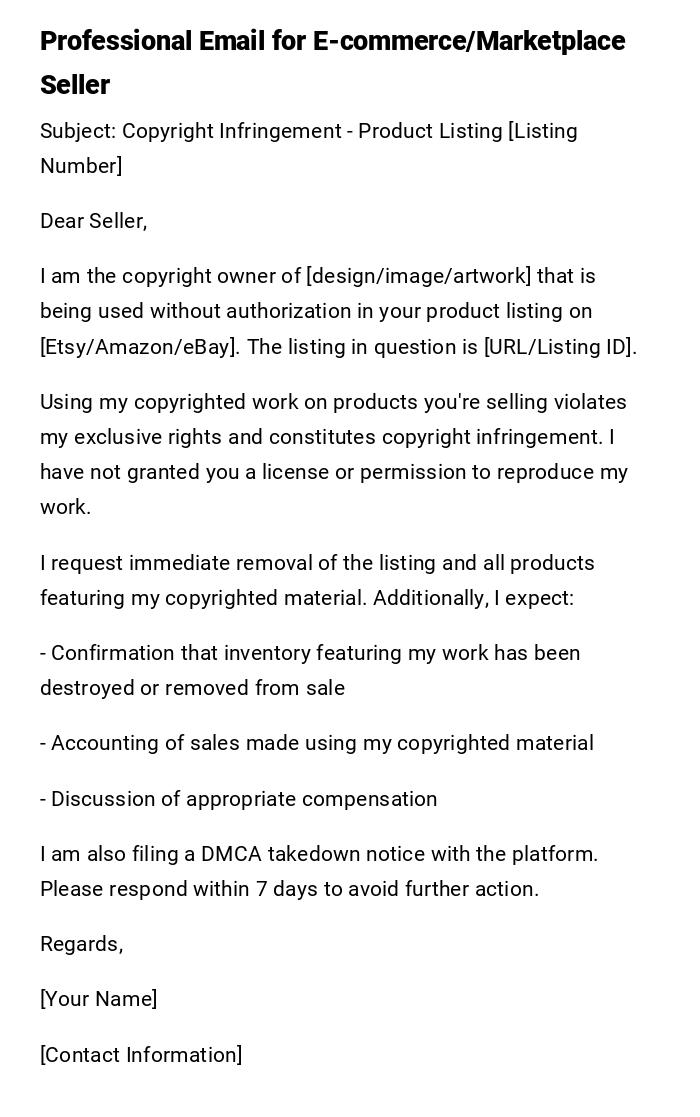
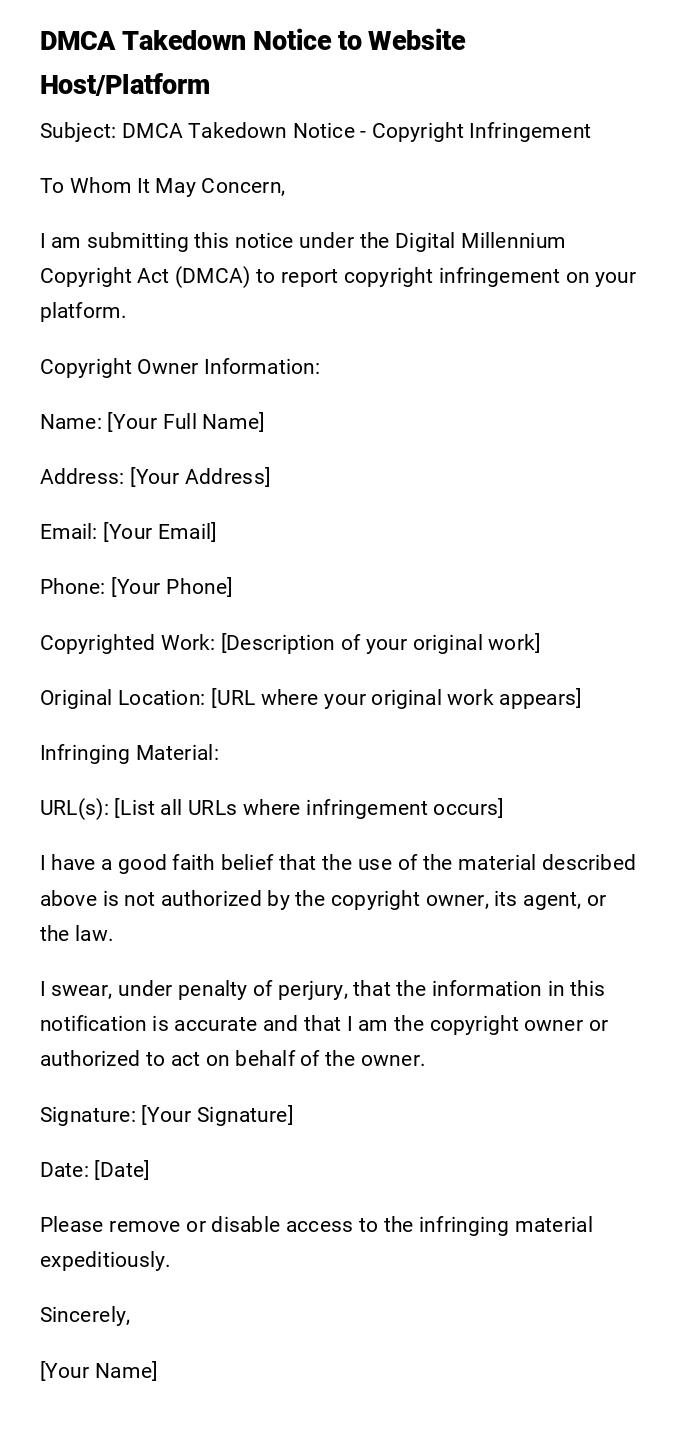

 Download Word Doc
Download Word Doc
 Download PDF
Download PDF